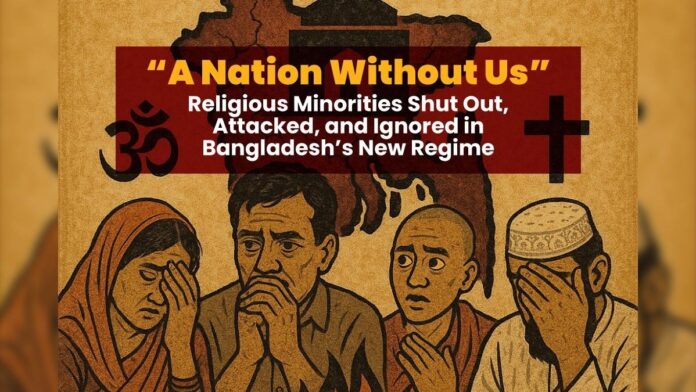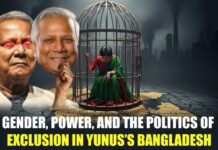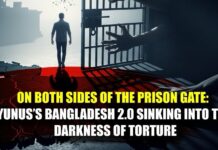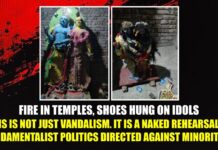
Leaders from the Bangladesh Hindu Buddhist Christian Unity Council have alleged that the interim government is systematically excluding religious minorities from the governance and reform process.
They point out that, aside from the Media Reform Commission, minorities are absent from every other reform committee. Despite the ongoing restructuring of key state institutions, no religious minority leaders have been consulted, leaving minority communities feeling anxious and alienated.
“Fear Is Growing Among Us”
Acting General Secretary Monindra Kumar Nath told Deutsche Welle:
“There is growing concern as the country heads toward elections. Since 2001, attacks on religious minorities during and after elections have become normalized. The current government is no exception. No commission—except the media reform commission—includes minority representation. Even in matters like constitutional amendments, our opinions were not solicited.
How can we hope for a secular state when we’re afraid to even make demands? In the past, we could at least expect police assistance. Now, they don’t even show up. Whenever something happens, mobs are mobilized, creating a terrifying situation.”
2,442 Incidents of Violence Against Minorities in 11 Months
From August 4, 2024, to June 30, 2025, the Unity Council recorded 2,442 incidents of violence against religious and ethnic minorities across Bangladesh. These include:
Murders
Sexual violence (including gang rape)
Attacks on places of worship
Arrests for blasphemy
Forced home and business seizures
Assaults on indigenous communities
Forced resignations
The majority of these incidents—2,010 cases—occurred in just 16 days from August 4 to August 20, 2024, with 27 people killed in the last six months alone.
The government’s refusal to acknowledge these as communal violence and its failure to prosecute offenders is seen as giving impunity to the perpetrators.
“The Exclusion Is Systematic and Intentional”
Council Vice President Nirmal Rosario said:
“We see the interim government’s reform process being completed without us. It’s incredibly disheartening. Whenever we raise concerns, they say it’s political, not religious persecution. But the media covers these events. Still, no action is taken. We feel completely helpless.”
Police Offer Legal Justification, Deny Communal Motive
In response, police HQ issued a statement:
Of the 27 killings, 22 were registered as murder cases, 5 as unnatural deaths.
Causes include land disputes, financial disagreements, robbery, gang violence, suicide, and even a fight over watermelon sales.
48 people have been arrested, 15 have surrendered, and 18 gave confessions under Section 164 of the Criminal Procedure Code.
The police claim that none of these killings were communal in nature.
In 20 cases of rape or gang rape, 16 resulted in formal charges and 25 arrests. Police also denied communal motive in rape cases involving indigenous women, citing family disputes or lack of evidence.
Most Intense Violence in August 2024
From August 4 to 20, 2024, a record 2,010 incidents occurred, 1,769 of which were communal in nature. Police verified 1,457 of these incidents in 56 districts, filed 62 cases, and made 35 arrests.
Yet only 62 cases were registered out of 1,457 confirmed events—indicating massive underreporting and limited accountability.
Police: “We Are Taking Action”
Police say they are conducting investigations with “utmost sincerity” and have taken security measures for affected communities and institutions.
But community leaders argue that actions on paper have not translated to protection on the ground.
Faith Leaders Speak Out: “We Are Losing Trust”
Advocate Suman Kumar Roy, General Secretary of the Bangladesh Sanatan Party, told Deutsche Welle:
“Can the government deny what’s happening to minorities? They imprisoned Chinmoy Krishna Brahmachari, spokesperson of the Sanatani Jagaran Jote in Chattogram, on a false case, and he’s been jailed for 8 months.
Even after securing bail from the High Court, new murder cases were filed against him.
If someone like Chinmoy can’t get bail, what hope is left for others? This is not a government for all.”
Durga Temple Demolished in Dhaka’s Khilkhet
In June, a temporary Durga mandap in Khilkhet, Dhaka, was bulldozed, destroying idols. The government said it was part of a campaign to remove illegal structures on railway land.
But Hindu leaders say they had obtained written permission to construct the mandap for worship in 2023. The temple committee, however, admitted they lacked approval to make the site permanent.
Following the demolition, Hindu leaders protested outside the National Press Club, also condemning other incidents:
Mob attacks in Lalmonirhat
Brutal violence in Jessore’s Abhaynagar
Retaliation against minority officials nationwide
“We’re Not Even Consulted” – Religious Leaders Left Out of Government
Basudev Dhar, President of the Puja Celebration Council, said:
“On August 13, interim Chief Adviser Dr. Yunus visited the Dhakeshwari Temple and said, ‘Let’s not divide ourselves into minority or majority; we are all citizens of this country.’
But in reality, we are completely excluded. New commissions are being formed, reforms are underway, yet not a single minority representative is included.
How can we trust this government?”
Council Vice President Nimchandra Bhowmik added:
“The communal atmosphere is worsening. Government rhetoric and inaction are emboldening mob violence. The state itself bulldozed a temple. If this continues, it will lead to a national crisis.”
The Gruesome Case of Basana Mallik
On December 24, 2023, Basana Mallik, a 50-year-old Hindu woman and elected Union Council member, was lured away, raped, and poisoned. She died a day later.
Her son Rinku Mallik said she was threatened and attacked for refusing to pay a BDT 200,000 extortion demand. Though police arrested four suspects, Rinku says the main culprit, Kibria, was not named in the initial complaint. Kibria died in a road accident days later.
“We’re poor. I don’t even know what’s happening with the case anymore,” Rinku said.
Police acknowledged arrests but claimed rape evidence was inconclusive due to the delayed autopsy.
Yet hospital officials at the time confirmed signs of sexual assault and poisoning.
Government: “No Killing Was Communal”
When asked about the Council’s report on persecution, Dr. A. F. M. Khalid Hossain, religious affairs advisor, echoed the police:
“None of the 27 deaths were due to communal violence. Causes include land disputes, drugs, robbery, and personal vendettas.”
He stressed:
“We view the country as one family. There are no minorities or majorities in the eyes of the law. Our ministry serves all faiths equally, promoting harmony.”
But Can Harmony Exist Without Justice?
Despite repeated statements of unity, the pattern of exclusion, violence, and impunity paints a troubling picture. Minority leaders say their trust in the system is eroding fast.
“If we’re not safe, not heard, not seen—then how can we believe this is our government?”



